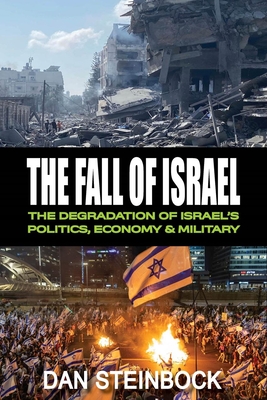
Steinbock, Dan
product information
description
October 7th; it was baked in the cake. The path to the obliteration of Gaza was paved by the confluence of a set of longstanding forces. This great conjuncture has transformed Israel and the occupied Palestinian territories. Dr Dan Steinbock connects the dots among these lethal headwinds.
What makes The Fall of Israel unique is its comprehensive scope. It covers Israel's political, economic, social and military changes, the shifts in the Palestinian struggle for sovereignty, Israel's degradation into apartheid rule, the attendant atrocities, the regional and global reverberations and the human and economic costs, both prior and subsequent to Israel's fatal war on Gaza. There, its nightmarish actions have led to the engagement of the International Court of Justice and the International Criminal Court, renewed international boycotts, and massive domestic and international protests.
The Fall of Israel outlines the central drivers of this simmering tinderbox: the serial expulsions of Palestinians, the expansion of Jewish settlements in the occupied territories, a half century of failed U.S. diplomacy in the Middle East and Israel's militarization, enabled by the symbiotic bilateral ties with the U.S. and massive U.S. military aid. In the Gaza War, these ties fostered paradigms of devastation, such as the Dahiya doctrine and mass assassination factories, backed by pioneering artificial intelligence. The settlements have contributed to the destabilization of the broader region since the early 1970s, and are now compounding its politico-economic and geopolitical crisis.
This book addresses the efforts to institute a Jewish rather than a secular state. It shows how the postwar labor alignments were replaced by the hard-right coalitions, thanks to U.S. neoliberal economic policies, assertive neoconservatism and Jewish-American donors. It also explains the causes behind the rise of the Messianic far-right, centrist parties, and the failure of the Left. The corrosion of Israeli society and politics was already reflected in and driven by an economy constrained by adverse erosion, as reflected by the liabilities of its high-tech cluster, the talent "brain drain," the threatened welfare state and subsidized religious sector. But now, the already evident politico-economic costs to Israel of the Gaza war have set the stage for extraordinary uncertainty in the foreseeable future.
What makes The Fall of Israel unique is its comprehensive scope. It covers Israel's political, economic, social and military changes, the shifts in the Palestinian struggle for sovereignty, Israel's degradation into apartheid rule, the attendant atrocities, the regional and global reverberations and the human and economic costs, both prior and subsequent to Israel's fatal war on Gaza. There, its nightmarish actions have led to the engagement of the International Court of Justice and the International Criminal Court, renewed international boycotts, and massive domestic and international protests.
The Fall of Israel outlines the central drivers of this simmering tinderbox: the serial expulsions of Palestinians, the expansion of Jewish settlements in the occupied territories, a half century of failed U.S. diplomacy in the Middle East and Israel's militarization, enabled by the symbiotic bilateral ties with the U.S. and massive U.S. military aid. In the Gaza War, these ties fostered paradigms of devastation, such as the Dahiya doctrine and mass assassination factories, backed by pioneering artificial intelligence. The settlements have contributed to the destabilization of the broader region since the early 1970s, and are now compounding its politico-economic and geopolitical crisis.
This book addresses the efforts to institute a Jewish rather than a secular state. It shows how the postwar labor alignments were replaced by the hard-right coalitions, thanks to U.S. neoliberal economic policies, assertive neoconservatism and Jewish-American donors. It also explains the causes behind the rise of the Messianic far-right, centrist parties, and the failure of the Left. The corrosion of Israeli society and politics was already reflected in and driven by an economy constrained by adverse erosion, as reflected by the liabilities of its high-tech cluster, the talent "brain drain," the threatened welfare state and subsidized religious sector. But now, the already evident politico-economic costs to Israel of the Gaza war have set the stage for extraordinary uncertainty in the foreseeable future.
member goods
No member items were found under this heading.
listens & views

RUSSIAN FOLK SONGS (AUS)
by HVOROSTOVSKY / RUSSIAN FOLK ORCH / KALININ
COMPACT DISCout of stock
$13.99
Return Policy
All sales are final
Shipping
No special shipping considerations available.
Shipping fees determined at checkout.






